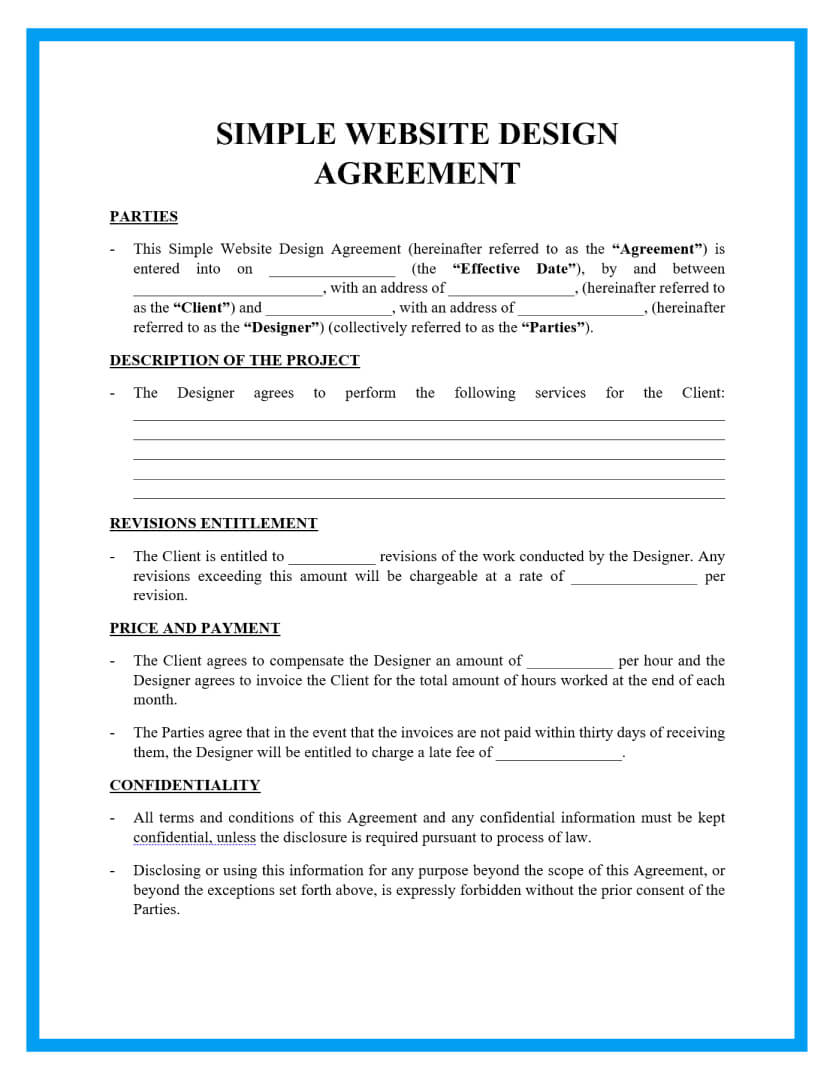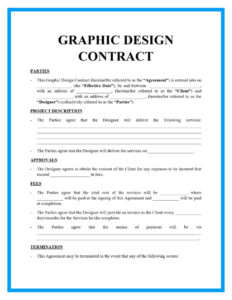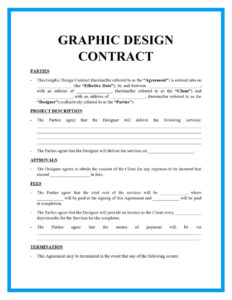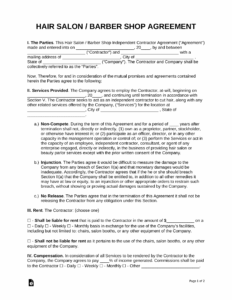Starting a new website design project can be incredibly exciting, filled with creative energy and big plans. However, amidst all that enthusiasm, it is easy to overlook one of the most crucial elements for a smooth and successful collaboration: a clear, legally sound contract. Whether you are a freelance designer, a small agency, or a client looking to commission a website, having an agreement in place protects everyone involved, defining expectations and responsibilities from day one. It transforms verbal discussions into actionable commitments, ensuring that both parties are on the same page.
Many designers and clients might hesitate at the thought of drawing up a complex legal document, fearing high costs or the time investment required. This is where the concept of an accessible solution comes into play. Imagine being able to set up professional project terms without the immediate need for extensive legal consultation. A reliable free website design contract template can be an invaluable starting point, providing a solid foundation for your project agreements, helping you establish professionalism and clarity right from the beginning.

Why a Website Design Contract is Absolutely Essential
Engaging in any professional service, especially something as intricate as website design, without a written agreement is like embarking on a journey without a map. There are countless opportunities for misunderstandings to arise, from the scope of work expanding beyond initial discussions to disagreements over payment schedules or intellectual property. A well-crafted contract serves as that essential map, guiding both the designer and the client through every stage of the project, clearly outlining expectations and preventing potential conflicts before they escalate.
Think of a contract as a detailed blueprint for your project. It meticulously lays out what is expected from the designer, what the client needs to provide, and how the entire process will unfold. This level of detail isn’t about fostering mistrust; it is about promoting transparency and ensuring that both parties can refer back to an agreed-upon document if any questions or ambiguities surface during the development phase. It brings a sense of order and professionalism to the creative chaos that sometimes accompanies ambitious design projects.
Moreover, a contract is not just about protecting the designer; it equally safeguards the client. It ensures that the designer delivers what was promised, within the agreed timeframe and budget. Without such a document, a client might find themselves with an unfinished website, unexpected extra costs, or a product that does not meet their initial vision. For the designer, it guarantees fair compensation for their work and protects them from scope creep, where the project continuously grows without additional payment.
A robust contract also helps in managing the often tricky subject of revisions and changes. It sets clear boundaries on how many rounds of revisions are included in the initial price and how additional changes will be handled and billed. This prevents endless cycles of design modifications that can drain a designer’s time and a client’s budget. It brings structure to the creative process, allowing for flexibility within a defined framework.
Key Elements Your Contract Should Cover
To ensure your website design project runs smoothly and professionally, any contract you use, especially a free website design contract template, should include several crucial components:
- Project Scope and Deliverables: Clearly define what services will be provided, the specific features of the website, and what final deliverables the client will receive.
- Payment Terms and Schedule: Outline the total project cost, payment milestones, due dates, and acceptable payment methods.
- Timeline and Milestones: Establish a realistic project timeline with key dates for each stage of development and delivery.
- Client Responsibilities: Specify what the client needs to provide, such as content, images, and timely feedback, to avoid project delays.
- Revisions and Change Requests: Detail the number of included revisions and the process and cost for additional changes.
- Intellectual Property Rights: Clarify who owns the design files, code, and content once the project is completed and paid for.
- Termination Clause: Explain the conditions under which either party can terminate the contract and the financial implications of doing so.
- Confidentiality: Include provisions to protect sensitive information shared between the designer and client.
- Dispute Resolution: Outline the steps to be taken if a dispute arises, such as mediation or arbitration.
Having these elements explicitly stated removes ambiguity and provides a clear reference point for everyone involved. It establishes the groundwork for a professional relationship built on trust and mutual understanding, ensuring that creative vision can flourish within a structured business framework.
Getting Started with Your Free Template
The idea of leveraging a free website design contract template might seem too good to be true, but in an age of abundant online resources, it is a practical way to professionalize your operations without significant upfront investment. These templates are typically designed by legal professionals or experienced industry experts, offering a comprehensive starting point that addresses the most common scenarios in website development. They democratize access to legal protection, allowing smaller businesses and independent designers to compete on a more level playing field.
However, it is crucial to remember that a template, no matter how well-crafted, is a starting point, not a final solution tailored specifically to your unique circumstances. While it provides a robust framework, it will invariably require customization to align with your specific project details, service offerings, and local legal requirements. Think of it as a quality vehicle that still needs to be fueled up and have its GPS programmed for your particular destination.
When customizing your template, pay close attention to the sections detailing the scope of work, payment terms, and intellectual property. These are areas where projects frequently encounter challenges. Be as specific as possible about the features your website will include, the technologies used, and the exact deliverables. Clearly define your payment schedule, including any deposits, milestone payments, and final balances, as well as late payment penalties if applicable.
Additionally, consider if your region or country has specific legal stipulations regarding contracts or intellectual property that might not be covered by a general template. It is always a wise practice to have a legal professional review your customized contract, especially for larger projects or if you are dealing with complex client requirements. This small investment can save you significant trouble and expense down the line, ensuring your document is not just comprehensive but also legally enforceable.
Embracing the use of a well-defined contract for your website design projects signifies a commitment to professionalism and clarity. It sets a positive tone for the entire collaboration, fostering an environment where creativity can thrive without being hampered by uncertainty. By taking the time to outline expectations and responsibilities clearly from the outset, both designers and clients can look forward to a more predictable, successful, and ultimately more satisfying project experience. It empowers everyone involved to focus on the exciting aspects of bringing a digital vision to life, confident that the foundational elements are firmly in place.



